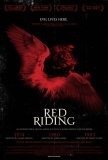Red Riding: 1974 (United Kingdom, 2009)
February 24, 2010
There are two commonly heard sayings about power. The first, "With great power comes great responsibility," sounds almost sanctimonious but represents the credo by which we expect heroic figures (such as policemen) to live. The second, "Power corrupts; absolute power corrupts absolutely" is attributed to figures of authority (such as policemen) who abuse what has been given to them. The Red Riding trilogy, based on a quartet of books by British novelist David Peace, examines the second, darker aspect of power - how a police force, seemingly existing for the purpose of protecting the public and promoting the general good - can rot from the inside out. Movies about police corruption are nothing new, but the approach taken by Red Riding is more uncompromising than most. This isn't a tale of some intrepid crusader uncovering the stench of moral decay and acting to cut out the infection. In the end, the good guys might win the war (although that is by no means certain), but they lose some ugly battles along the way.
Red Riding: 1974 sets up a trilogy but can be viewed as stand-alone motion picture. Much of what becomes background material for the second and third films works effectively as the main story for this movie as long as loose ends are tolerated. The three Red Riding movies were made back-to-back-to-back (with the same writer but different directors) so there was never any question of parts two and three not being filmed. Nevertheless, one can appreciate the first chapter either on its own or as a part of a larger cycle. (In the U.K., the movies were shown on television. In the U.S., they are being bundled into a single six-hour theatrical "event" with two intermissions.)
The main character in Red Riding: 1974 is journalist Eddie Dunford (Andrew Garfield, a rather ineffective leading man). It's 1974 (as the title proclaims) and the place is the grim, gray town of Fitzwilliam (in West Yorkshire), where the cooling towers of a nuclear power plant tower over everything like uncaring sentinels. This is one of those movies in which the location has as powerful a presence as any of the flesh-and-blood characters. And, although three different cinematographers worked on the movies using different styles (Red Riding: 1974 was shot in 16mm; Red Riding: 1980 was shot in 35mm; Red Riding: 1983 was shot in digital), there's a remarkable sense of continuity in the way they represent the area. The years may change but the countryside and its unpleasant atmosphere does not. The Yorkshire tourist bureau (if there is one) would not want to use these movies as publicity.
A serial killer is at work. Children are being kidnapped, tortured, raped, and murdered. The police, led by the low-key Maurice Jobson (David Morrissey) and the pugnacious Billy Molloy (Warren Clarke), are hard at work on the case but don't seem to be making much progress. The Yorkshire Post assigns Eddie to the story but he spends too much time drinking, sleeping late, and being in the wrong place at the wrong time to be reliable. Meanwhile, his best friend, Barry Gannon (Anthony Flanagan), believes he has caught a break on an unrelated case. Eddie becomes embroiled in an increasingly murky situation when his pursuit of a lead results in a romantic relationship with Paula Garfield (a mesmerizing Rebecca Hall), the mother of one of the dead girls. Then Barry is killed in a suspicious "accident" and one of the richest and most powerful men in the area, land developer John Dawson (Sean Bean, ostentatious as always), decides that Eddie is asking too many questions.
Red Riding: 1974 is a challenge. The convoluted story is not easily summarized and it demands constant viewer attention. A two-minute trip to the lavatory or snack bar can be deadly. For American audiences, there is an additional problem: some of the accents are so thick that it can be difficult to decipher dialogue and entire passages may be missed. I'm generally not in favor of subtitling English movies in English, but this is one occasion when such an approach might have been helpful.
Although aspects may seem familiar to fans of murder mysteries, Red Riding: 1974 distinguishes itself during its second half as the central crime becomes a side issue. The deeper we get into the story, the more we realize this is not so much about who killed the girls as why the killer's identity hasn't been revealed and whether the police have known all along. Eddie's investigation takes some unexpected detours and the final result of his poking and prodding has unexpected consequences. Red Riding: 1974 achieves a sort of closure but there are enough unresolved secondary plot lines that it's not hard to imagine where a follow-up chapter could gain altitude. (More of these are addressed in the third movie than in the second one.)
There are times when the movie is slow going. Patience is rewarded not only in the second half of this film, when the violence mounts and secrets are revealed, but during the subsequent productions, when a degree of familiarity with the initial narrative bears fruit. Red Riding: 1974 is the weakest of the three Red Riding films, but it is effective at setting the stage, introducing some of the characters, and capturing the attention of those who love gritty, uncompromising dramas about police corruption and the dark side of human nature.
Red Riding: 1974 (United Kingdom, 2009)
Cast: Andrew Garfield, Robert Sheehan, John Henshaw, Eddie Marsan, Peter Mullan, David Morrissey, Anthony Flanagan, Rebecca Hall, Sean Bean, Warren Clarke
Screenplay: Tony Grisoni, based on the novel by David Peace
Cinematography: Rob Hardy
Music: Adrian Johnston
U.S. Distributor: IFC Films
U.S. Release Date: 2010-02-05
MPAA Rating: "NR" (Violence, Profanity, Sexual Content, Nudity)
Genre: THRILLER/DRAMA
Subtitles: none
Theatrical Aspect Ratio: 1.85:1
- (There are no more better movies of John Henshaw)
- (There are no more worst movies of John Henshaw)

Comments